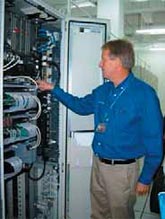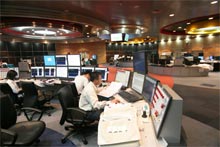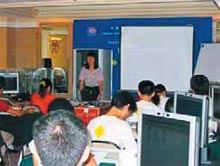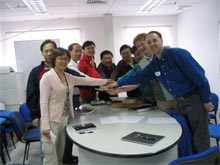Executive Summary
The largest FOUNDATION Fieldbus™ installation in the world

CSPC Nanhai Petrochemicals Complex
- 16,000 FOUNDATION Fieldbus devices out of 60,000 I/O points
- Main Automation Contractor (MAC) from early engineering stage through start-up/commissioning
- DCS anywhere concept integration with site SAP system
- Long term maintenance contract
- Sustainable development
Project Overview
CNOOC and Shell Petrochemicals Company Ltd., (CSPC) is a joint venture between Shell Nanhai B.V., a member of the Royal Dutch Shell, with a 50% stake, and CNOOC Petrochemicals Investment Limited (CPIL), also with 50% CPIL is owned by China National Oil Corporation (CNOOC)(90%) and Guangdong Guangye Investment Group Co., Ltd. (10%). The total investment is US$4.3 billion.
The complex has 11 process units. A lower olefins plant produces ethylene and propylene, the feed for the other units in the complex. The downstream units are LDPE, LLDPE/HDPE, PP, SM/PO, EO/EG, and MPG/Polyols. The total output from the complex is 2.3 million tpa. Apart from the process units, the project also involves the engineering and construction of utilities (including steam and power plant) and logistics.
The Challenges and the Solutions
Plant Resource Manager (PRM), a real-time device management and advanced diagnostics software package, connects to the 16,000 FOUNDATION Fieldbus devices and enables a problem to be diagnosed and an alert issued before the instrument actually fails and disrupts a process. The system continuously monitors the health of the instrumentation, resulting in increased reliability and fewer suspect measurements. With this preventive maintenance capability, plant operators can have greater confidence that their facility will perform as expected.

Field auxiliary room
The system has an approximate total of 60,000 I/Os, of which 16,000 are FOUNDATION Fieldbus devices. There are 200,000 software I/O tags and around 3000 segments, and these are controlled by nine CENTUM CS 3000 distributed control systems and 120 field control stations (FCS).
To control the field instrumentation, there are three control centers and fifteen field auxiliary rooms, and they are connected by fiber optic cables to form a plant control information network( PI-LAN).
Yokogawa was selected as the main automation contractor for this project and the Yokogawa project team has been involved in this from the front end engineering design phase, ensuring complete consistency in specifications. The functional design specification phase, detailed design specification phase, staging, factory acceptance test, site acceptance test, and commissioning were all well organized and carried out together with EPC contractors through a project management contractor.

Control center
The DCS anywhere concept stresses the importance of having access to the control room from any location in the plant or office to perform diagnosis, monitoring, and management. Our plant information network is one of the most advanced in the world today.
A unique feature of this project is our sustainable development program. Yokogawa has not only worked together with CSPC to construct a large petrochemicals complex, it has helped train its local employees in process control and current process instrument technology.

Sustainable development Program

Mutual trust
System delivered
- DCS: CENTUM CS 3000 with FOUNDATION Fieldbus devices
- Plant Resource Management Package (PRM)
- Operational Data System (ODS): Yokogawa Exaquantum
- Movement Automation System (MAS)
- Industrial TV: FIELDEYE
Industrie
-
Bulk & Petrochemical
Whether you produce petrochemicals, inorganics or intermediates, chemical companies are under cost and margin pressures to deliver products in a timely and efficient manner while maintaining safe and compliant operations. Additionally, chemical companies need to adjust to fluctuating feedstock and energy prices and to provide the most profitable product mix to the market.
Yokogawa has been serving the automation needs of the bulk chemical market globally and is the recognized leader in this market. With products, solutions, and industry expertise, Yokogawa understands your market and production needs and will work with you to provide a reliable, and cost effective solution through the lifecycle of your plant.
-
Chemical
Chemical plants rely on continuous and batch production processes, each posing different requirements for a control system. A continuous process calls for a robust and stable control system that will not fail and cause the shutdown of a production line, whereas the emphasis with a batch process is on having a control system that allows great flexibility in making adjustments to formulas, procedures, and the like. Both kinds of systems need to be managed in available quality history of product, and to be able to execute non-routine operations. With its extensive product portfolio, experienced systems engineers, and global sales and service network, Yokogawa has a solution for every plant process.
-
Petrochemical
Petrochemical companies’ needs are extremely diverse. To come out ahead in today’s highly competitive marketplace, producers are striving to improve quality and productivity. Yokogawa provides tailor-made solutions for these needs based on its long and wide-ranging experience in this field.
Prodotti e Soluzioni Correlati
-
Innovative MAC Services
Yokogawa's main automation contractor (MAC) service delivers the full scope of project execution capabilities. Yokogawa assumes responsibility for all automation-related aspects of the project, helping you meet budget, time, manpower, delivery, and risk management needs.
-
Plant Resource Manager (PRM)
Have the facility managed properly for high-reliable and stable plant operation? PRM contributes to improving the quality of maintenance plans and optimizing maintenance costs throughout the plant life cycle.
-
Security Program
Yokogawa’s cybersecurity services take a lifecycle approach to help customers control the security risks and manage them to achieve the highest business continuity plan throughout the plant’s entire lifecycle.